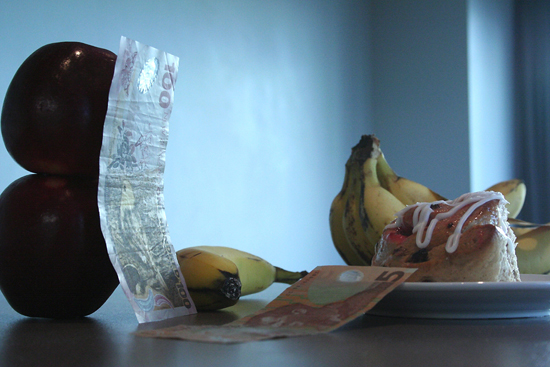
OPINION: Each day when I bite into my hamburger, I wish I had swiped my dual-currency MasterCard at the checkout a day earlier.
I am the breadwinner back home in China, and the New Zealand bills for groceries during my three-month stint in Auckland are being paid with US dollars. Unfortunately, the soaring kiwi against the greenback has had an impact on people like me, with the latest post-float highs rocketing to US87.92c.
The surge has left the kiwi doubling its nominal value – US44c – when it was floated in 1985. And the rate of the currency's appreciation has outpaced what was anticipated. The New Zealand dollar has risen more than 5 percent this month and 20 percent this year.
A thief from nowhere
As a result, my money value - based on yuan currency – is decreasing each day that passes by. On July 12 — the day I landed in New Zealand – it cost me about NZ$20 to satisfy my stomach. The bill was settled by US$16.36 (or 105.72 yuan) on the basis of the kiwi being worth US81.79c. But now - almost three weeks later - on August 1, the kiwi has appreciated to US87.92c.
My NZ$20 food order now costs me US$17.58 (or 113.17 yuan).
Where has my 7.45 yuan gone? I have failed to find the thief who has stolen my money. Perhaps, I should ask the US Federal Reserve for the money back, suggested a financially-minded friend of mine.
He even forecasts that the US federal fiscal crisis this week, either a potential default or a debt ceiling raise, may push the kiwi to climb further.
According to a New Zealand Herald report, Prime Minister John Key, said last week the US Federal Reserve's quantitative easing (QE) policies also helped push New Zealand's currency up. The policy was equally criticised by Chinese economists, who insisted QE had the effect of devaluing the US dollar and driving the appreciation of the yuan.
Effects of flying kiwi
The record high kiwi is not only felt by me, a Chinese journalist on a semester-long course in New Zealand, but also by other international students studying at AUT University - from countries including Malaysia, Russia, Germany and India. My friends from there have all complained to me that the cost for studying here is becoming higher.
The appreciation has also taken a toll on exports. Data showed Kiwi export values in June at NZ$3.97 billion, more than NZ$200 million less than expected.
It isn't all bad news. The surging New Zealand dollar, however, makes a good deal for Kiwi tourists. It helped fuel a surge of outbound tourists, who found a visit to other countries markedly cheaper. According to local reports, Statistics NZ figures showed the high kiwi dollar had "translated into a 15 percent increase in overseas trips in the past two years".
United Travel Takapuna owner Jeremy Shanahan told the Herald three-star accommodation in London that traditionally cost around NZ$300 could now be picked up for under NZ$200.
But the high-flying kiwi has had the opposite effect on in-bound tourism. Data showed the number of overseas tourists coming to the country has dropped below the post 9/11 threshold.
My dream
I have been told earlier the kiwi is a flightless bird endemic to New Zealand. I thought it could not fly.
But I was wrong. The bird printed on bank notes can fly higher.
I just hope it will not soar too high. Otherwise, the bird will keep away prospective inbound tourists and foreign students, and even erode New Zealand’s export competitiveness.



